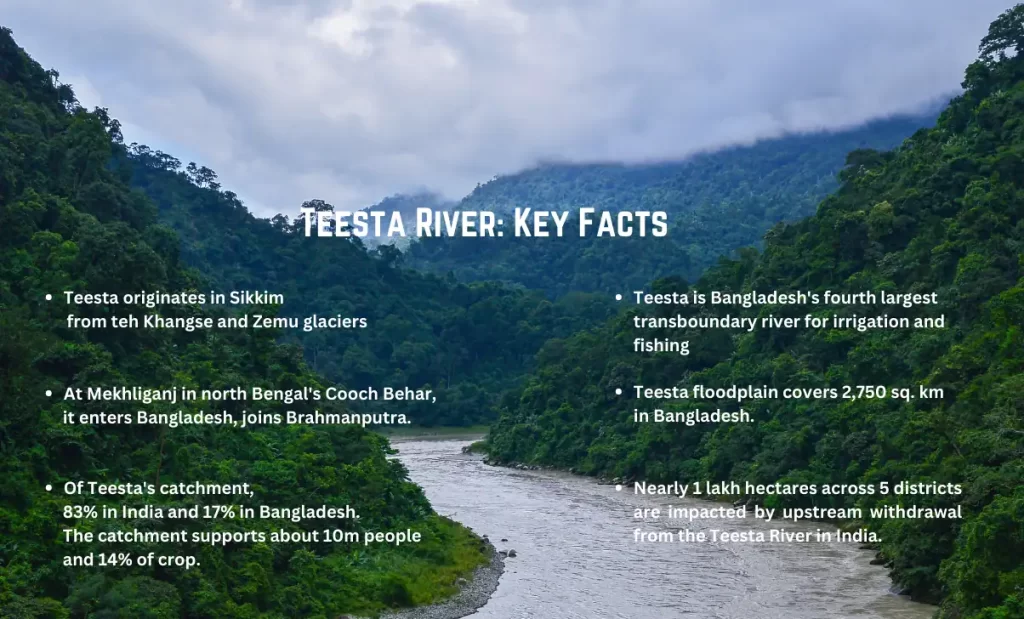China’s interest in the Teesta River, a transboundary river that flows through India and Bangladesh, has raised eyebrows in the region. The Teesta River is a significant source of water for India and Bangladesh, and its waters have been a point of contention between the two countries for decades. However, China’s involvement in the Teesta River dispute has added a new dimension to the conflict. This article explores China’s interest in the Teesta River and its implications for the region.
Historical Background
The Teesta River dispute dates back to the 1980s when India and Bangladesh began negotiations over the sharing of Teesta waters. However, the two countries have failed to reach an agreement due to disagreements over the allocation of water. In recent years, China has become involved in the dispute. In 2017, China offered to mediate between India and Bangladesh over the Teesta River dispute. The move was seen as a significant development in the region as China’s involvement could potentially shift the balance of power.
China’s Strategic Interests
China’s interest in the Teesta River can be attributed to its strategic ambitions in the region. The Teesta River originates in the Himalayas and flows through the Indian states of Sikkim and West Bengal before entering Bangladesh. The river is crucial for the economic development of the region as it is a source of water for agriculture and hydroelectric power generation.
China’s Belt and Road Initiative (BRI) has further intensified its interest in the region. The BRI is a global infrastructure development strategy that aims to connect Asia, Europe, and Africa. The Teesta River is a part of the BRI’s Bangladesh-China-India-Myanmar Economic Corridor (BCIM-EC). The BCIM-EC is a proposed economic corridor that will connect China’s southwestern province of Yunnan to India’s eastern state of West Bengal via Bangladesh and Myanmar.
China’s involvement in the Teesta River dispute is seen as a strategic move to gain influence in the region. China’s growing economic and political influence in the region has raised concerns in India. India has been skeptical of China’s involvement in the region and has viewed it as an attempt to encircle India.
Why Does Bangladesh Seek China’s Help in the Teesta River Dispute?
Bangladesh has been pushing for a fair share of Teesta waters for years, but negotiations with India have failed to yield results. China’s involvement in the dispute is seen as an opportunity for Bangladesh to break the deadlock and get a fair share of Teesta waters.
India’s Concerns Over China’s Interest in the Teesta River
India has been particularly concerned about China’s interest in the Teesta River. The river is an important source of water for the Indian state of West Bengal, which has been adversely affected by the lack of water. India has accused China of building dams and diverting water from the Brahmaputra River, which flows into the Teesta, to its own benefit. China has denied these allegations, but the suspicions have deepened India’s skepticism of China’s involvement in the region.
Environmental Concerns
The Teesta River dispute is not just a political issue; it also has environmental implications. The river is a crucial source of water for agriculture and hydroelectric power generation in the region. However, the construction of dams and barrages on the river has resulted in a decline in the river’s flow, which has had adverse effects on the environment. The reduction in water flow has resulted in soil erosion, loss of wetlands, and a decline in fish populations.
China’s plans to build dams on the Teesta River have raised concerns about the environmental impact of the project. Environmentalists have warned that the construction of dams on the river could have severe ecological consequences. The dams could result in the
drying up of downstream areas, which would have a significant impact on the livelihoods of people in the region.
Sustainable Development
Sustainable development has become a critical issue in the region, and the Teesta River dispute highlights the need for sustainable development practices. The sustainable use of water resources is essential for the economic development of the region and the well-being of the people. The Teesta River dispute provides an opportunity for India, Bangladesh, and China to work together to develop sustainable solutions to the issue. The three countries need to engage in meaningful dialogue and collaboration to ensure that the Teesta River is used sustainably.
Role of International Organizations
The Teesta River dispute is a complex issue, and international organizations have a crucial role to play in resolving it. The United Nations has been involved in the Teesta River dispute since 2010, and the World Bank has been facilitating negotiations between India and Bangladesh. The involvement of international organizations is necessary to ensure that the dispute is resolved in a fair and transparent manner.
Summary
The Teesta River dispute is a complex issue that has implications for the region’s economic development, environment, and geopolitical landscape. China’s interest in the river has added a new dimension to the conflict, and its involvement has raised concerns in India. The dispute highlights the need for sustainable development practices and meaningful collaboration between India, Bangladesh, and China. The involvement of international organizations is crucial to resolving the dispute in a fair and transparent manner. The Teesta River dispute provides an opportunity for the region to work together towards sustainable development and cooperation.








